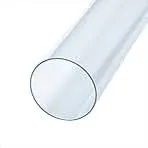दिसम्बर . 24, 2024 01:25 Back to list
hdpe agriculture pipe
Understanding the Role of HDPE Agriculture Pipes in Modern Farming
In the modern era of agriculture, the need for efficient water management systems has never been more critical. One of the most significant advancements in this regard is the use of High-Density Polyethylene (HDPE) pipes for irrigation and other agricultural practices. These pipes, renowned for their durability, flexibility, and resistance to various environmental factors, have revolutionized how water is conveyed in farming operations.
What is HDPE?
High-Density Polyethylene (HDPE) is a thermoplastic made from petroleum. It has been widely adopted in various industries due to its remarkable strength-to-density ratio. In the agricultural sector, HDPE pipes are particularly favored for their non-toxic nature, ensuring that they do not leach harmful substances into the water being transported. This property is crucial in agriculture, where water quality can significantly affect crop health.
Benefits of HDPE Agriculture Pipes
1. Durability and Longevity HDPE pipes are designed to withstand harsh environmental conditions, making them ideal for agricultural use. They are resistant to corrosion, which is a common problem with traditional metal pipes. This durability translates into a longer lifespan and reduced maintenance costs.
2. Flexibility and Lightweight Unlike rigid piping systems, HDPE pipes are highly flexible and can be easily installed in various terrains, including uneven or rocky landscapes. Their lightweight nature also simplifies transportation and installation, which can save time and labor costs.
3. Resistance to UV Rays and Chemicals Agricultural environments expose pipes to varying weather conditions and chemical agents, such as fertilizers and pesticides. HDPE pipes resist UV radiation and many chemicals, ensuring that they remain intact and functional despite exposure to harsh elements.
4. Efficient Water Management HDPE pipes allow for efficient water distribution systems, crucial for irrigation practices. They can be used in drip irrigation systems, which deliver water directly to the roots of plants, minimizing water wastage and maximizing crop yield. This precision in water application is essential in conserving resources, especially in regions where water scarcity is a pressing issue.
5. Cost-Effectiveness While the initial investment in HDPE piping may be higher than traditional materials, the long-term savings on maintenance, replacement, and water conservation make them a more economical choice. Their longevity and reduced need for repair contribute to overall lower operational costs.
hdpe agriculture pipe

Applications of HDPE Pipes in Agriculture
HDPE pipes are versatile and can be utilized in various agricultural applications, including
- Irrigation Systems Whether for sprinkler systems, drip irrigation, or surface irrigation, HDPE pipes optimize water usage, ensuring that crops receive adequate hydration without wastage.
- Drainage Systems Proper drainage is crucial in agriculture to prevent waterlogging and protect root systems. HDPE pipes can efficiently manage excess water, helping maintain optimal soil conditions.
- Water Supply Lines HDPE pipes can also serve as reliable water supply lines connected to storage tanks or wells, ensuring a steady water supply for farming operations.
Environmental Impact
The agricultural sector significantly contributes to environmental degradation, primarily through water overuse and contamination. However, HDPE pipes promote sustainability by enabling more efficient water usage practices. By reducing runoff and facilitating targeted irrigation, these pipes help conserve water resources and minimize the ecological footprint of farming.
Additionally, HDPE is recyclable, which aligns with the increasing push for sustainable practices in agriculture. Farmers can therefore replace old pipes or systems without significantly impacting the environment, promoting a circular economy.
Conclusion
The use of HDPE agriculture pipes marks a significant advancement in efficient water management in farming. Their durability, flexibility, and resistance to environmental factors make them an ideal choice for modern agricultural practices. As farmers continue to face challenges such as water scarcity and the need for sustainable practices, investing in HDPE technology provides a promising solution that can enhance productivity while promoting environmental stewardship. As agriculture evolves, the adoption of innovative solutions like HDPE pipes will be essential in paving the way for a sustainable future.
-
Durable PP Rigid Sheet: Lightweight, Chemical Resistant Solutions
NewsAug.21,2025
-
PVC Grey Sheet for Extraction: Chemical Resistant & Durable
NewsAug.19,2025
-
Durable PVC Pipe Fittings for Plumbing & Irrigation Needs
NewsAug.18,2025
-
HDPE Steel Belt Reinforced Spiral Corrugated Pipe | High Strength
NewsAug.17,2025
-
HDPE Pipe Fittings: Durable, Leak-Proof Solutions
NewsAug.16,2025
-
Premium CPVC Sheet: High-Temp & Chemical Resistant Solutions
NewsAug.15,2025

